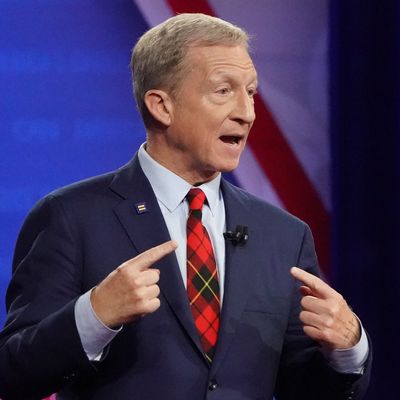
Most of the 12 debaters who will be on the stage in Ohio on Tuesday (a dozen, now that Tulsi Gabbard announced she will not go through with her threat to boycott the event as part of a DNC–media scheme to “rig” the nomination contest) are familiar figures to those who tune in regularly to these spectacles. Ten of them have been in all three previous debates, and Gabbard missed the September stage. But now, voters will see someone who might be a new face: Tom Steyer.
The billionaire activist will make his debut at the fourth debate, after his strategy of heavy spending in early states whose polls help candidates qualify for these events paid off. Steyer has rarely earned more than one percent in national polls of the 2020 field. But his polling average (according to RealClearPolitics) is at 2.3 percent in Iowa, 2 percent in New Hampshire, 3.5 percent in Nevada and 3 percent in South Carolina. (Interestingly enough, he barely registers support in his current home state of California, despite his conspicuous involvement, mostly as a big donor, in the progressive politics of the Golden State for years.) The debate is a great opportunity for him to expand his national profile after a late start, but how will he use that opportunity?
Presumably he will try to introduce himself to voters in places that haven’t seen his campaign ads or his earlier spots promoting impeachment of Trump long before that became a majority position among Democratic pols. He could tout his leadership on that issue, though it’s no longer controversial in his party (the entire presidential field has now endorsed impeachment proceedings). Or he could talk about his pre-impeachment focus on promoting climate-change activism (one observer called him “the green-minded answer to the conservative Koch brothers”) even though that might open him up to questions about the fossil-fuel investments made by the hedge-fund enterprise that earned him his fortune. But mostly you can expect him to exploit his position as one of the only two non-politicians on the stage (the other is Andrew Yang) to push his progressive version of Trump’s own populist-outsider-too-rich-to-be-bought message. The New York Times noted the central paradox of Steyer’s campaign in late August:
Running as something of a patrician populist, Mr. Steyer brushed aside the dissonance of someone with his résumé — Exeter, Yale, Stanford, Morgan Stanley, Goldman Sachs — paying for ads that castigate the influence of “the powerful and well-connected.”
“I am the outsider in this race,” Mr. Steyer said in an interview. He described Senators Elizabeth Warren of Massachusetts and Bernie Sanders of Vermont as “part of the establishment” and asked whether the front-runner in the polls, former Vice President Joseph R. Biden Jr., really understood what this moment called for.
“The question really is for anybody running, including Vice President Biden, are you aware of how much has to change?” Mr. Steyer said, outlining a two-pronged agenda that would begin with rule changes to curb corporate power followed by significant action to address climate change.
This sort of talk might attract some fire from candidates like Warren and Sanders if they deign to pay much attention to Steyer during the debate. And rivals and moderators alike could bring up the common complaints that Steyer basically bought his spot on the stage with all that early-state spending, and that the $100 million he has pledged to pony up for his campaign would be better invested in down-ballot candidates or get-out-the-vote efforts.
It’s unclear what sort of personal impression Steyer will make with viewers. He is, after all, another older (62) straight white male who doesn’t have the sort of biography that lends itself to Democratic political audiences. He is religiously observant (an Episcopalian like Pete Buttigieg, the most conspicuous churchgoer in the field), and doesn’t seem to have typical rich-guy vices or outlandish tastes. CalMatters summed up his personal style succinctly:
Steyer is a bit of a contradiction himself. In the mold of Warren Buffet, he is famously restrained in his spending habits (to a point). His sartorial style could be described as “Boomer dad”: He regularly wears the same tartan tie and a colorful beaded belt he bought on a trip to Kenya. He flies commercial, for environmental reasons. Speaking to CalMatters over the phone from Iowa, he recalls meeting a “slick-as-could-be” energy lobbyist a few years back who was wearing a “$5,000 suit.” As if Steyer couldn’t drop ten times that on a new outfit every morning for the rest of his life.
Like Buffett, Steyer also has pledged to give away at least half of his wealth before he dies.
So Steyer is a paradoxical man running on a paradoxical platform. No matter how he does in his first debate, he probably isn’t going anywhere soon. He’s already qualified for the next debate in November. He obviously doesn’t need to worry about running out of money (he managed to raise $2 million from other people in the third quarter of this year). And as a hypersuccessful investment manager, he probably won’t be willing to write off the dough he’s already dropped in the early states until voters vote.
Get used to seeing him and hearing this self-styled billionaire scourge of the billionaires.






























